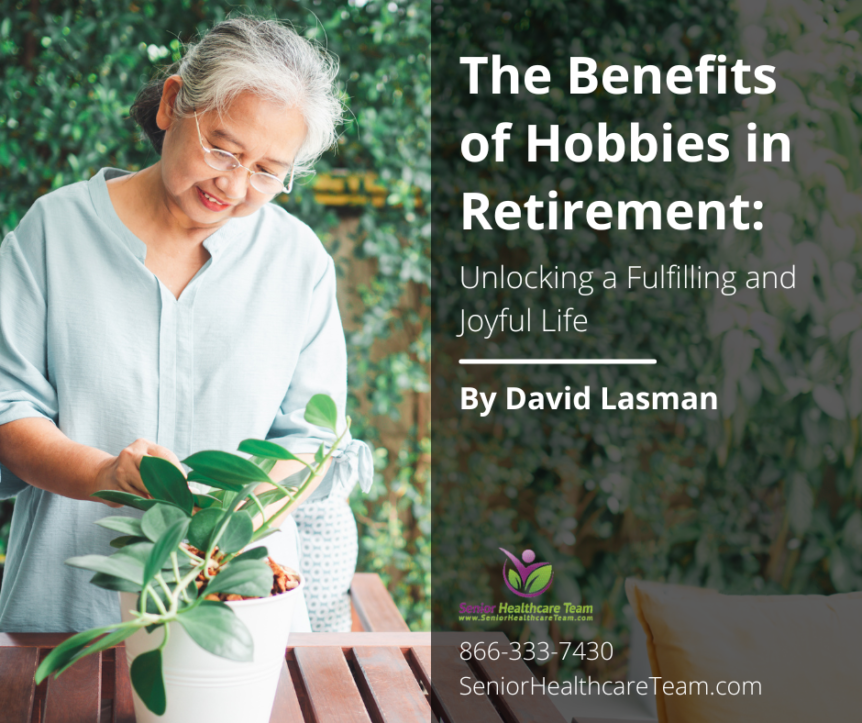Retirement marks a new chapter in life—a chance to embrace freedom, explore interests, and prioritize personal happiness. While the absence of a daily work schedule can initially feel liberating, it can also leave retirees searching for structure and purpose. Hobbies provide the perfect solution, offering a wide range of benefits that enhance mental, physical, and emotional well-being. Let’s explore why hobbies are essential in retirement and how they contribute to a vibrant, fulfilling life.
Rediscovering Purpose and Identity
After decades of defining themselves through careers or family responsibilities, retirees may experience a sense of loss when these roles shift. Hobbies allow individuals to rediscover their identity and cultivate new passions. Whether it’s gardening, painting, or joining a book club, hobbies give retirees a sense of accomplishment and direction.
Example: A retired teacher might take up writing a memoir or mentoring young writers, translating their past experience into a new, meaningful pursuit. This not only keeps them engaged but also reinforces a sense of contribution and purpose.
Boosting Mental Health and Reducing Stress
Engaging in hobbies helps alleviate stress and promotes mental well-being. Activities such as knitting, playing an instrument, or solving puzzles stimulate the brain and encourage mindfulness. This focus on the present moment can reduce anxiety and create a calming effect.
Hobbies that involve creative expression, like painting or crafting, are particularly therapeutic. They allow retirees to channel emotions into their work, fostering a sense of inner peace and satisfaction.
Scientific Insight: Studies have shown that hobbies can lower cortisol levels (the stress hormone) and increase dopamine production, which enhances feelings of happiness and relaxation.
Maintaining Cognitive Sharpness
Retirement doesn’t mean retiring the mind. Hobbies that challenge the brain can improve memory, problem-solving skills, and overall cognitive function. Learning a new language, playing chess, or mastering a musical instrument are excellent ways to keep the mind sharp.
The Power of Lifelong Learning: Studies reveal that adults who engage in mentally stimulating activities are less likely to develop conditions like Alzheimer’s or dementia. Taking up a mentally engaging hobby could be as simple as completing daily crossword puzzles or enrolling in an online course.
Fostering Social Connections
Loneliness and isolation are common challenges in retirement, but hobbies provide opportunities to build meaningful relationships. Group activities like dancing, playing cards, or participating in local clubs bring people together around shared interests.
Example: Joining a walking group not only promotes physical fitness but also provides a supportive social circle. Social interaction has been proven to boost mood and even extend life expectancy.
Enhancing Physical Health
Physical hobbies like hiking, yoga, or golfing offer retirees a way to stay active while doing something they enjoy. Regular physical activity improves cardiovascular health, strengthens muscles, and enhances overall mobility, helping retirees maintain independence as they age.
Low-Impact Options: For those with limited mobility, activities like tai chi, water aerobics, or gardening can provide gentle yet effective exercise. These hobbies promote flexibility, balance, and strength without straining the body.
Cultivating Creativity and Imagination
Retirement is the perfect time to explore creative pursuits that may have been sidelined during one’s working years. Hobbies like painting, photography, or woodworking allow retirees to express their unique perspective and develop new skills.
Creative hobbies can also lead to unexpected opportunities, such as selling handmade crafts online or exhibiting artwork in a local gallery. These achievements boost confidence and provide an additional sense of accomplishment.
Providing Structure and Routine
One of the biggest adjustments in retirement is the loss of a daily schedule. Hobbies offer a sense of structure, giving retirees a reason to get out of bed each day and look forward to the hours ahead.
Example: A retiree who takes up gardening might start each morning by tending to plants, creating a daily ritual that provides both physical activity and mental relaxation. This sense of routine fosters stability and predictability, which are especially valuable during periods of change.
Strengthening Family Bonds
Hobbies can also be a way to connect with family members. Sharing an interest in baking, genealogy, or playing board games creates opportunities for quality time and strengthens intergenerational relationships.
Example: Grandparents who enjoy storytelling or scrapbooking can involve grandchildren, passing down family traditions and creating cherished memories.

Exploring New Adventures
Retirement offers the freedom to try hobbies that were previously out of reach due to time constraints. From learning to scuba dive to taking cooking classes, retirees can step outside their comfort zones and discover new talents.
Travel and Hobbies: For those with a love of exploration, combining hobbies with travel can be incredibly rewarding. Photography enthusiasts, for instance, might plan trips to picturesque destinations to capture stunning images, blending passion with adventure.
Promoting Emotional Resilience
Hobbies act as a healthy outlet for coping with life’s challenges, such as health concerns or the loss of loved ones. They provide a distraction from negative thoughts and foster a sense of control over one’s environment.
Therapeutic Benefits: Activities like journaling or painting allow retirees to process emotions and reflect on their experiences. By engaging in a fulfilling pastime, retirees can build emotional resilience and maintain a positive outlook on life.
Giving Back to the Community
Many retirees find joy in hobbies that involve volunteering or contributing to their community. Whether it’s teaching a skill, participating in local clean-up events, or knitting blankets for charity, these activities provide a sense of purpose and foster connection with others.
Example: A retired engineer might volunteer to teach STEM workshops at schools, combining their expertise with their love for mentoring. This not only benefits the community but also reinforces the retiree’s sense of value and accomplishment.
Financial Opportunities
Some hobbies have the potential to turn into side businesses, offering retirees an additional source of income. For example, woodworking, crafting, or baking could lead to selling products at local markets or online platforms like Etsy.
Example: A retiree with a passion for photography could offer services for events or sell prints. While the goal isn’t necessarily to make money, these opportunities can add a layer of excitement and purpose to a hobby.
Tailoring Hobbies to Individual Needs
The beauty of hobbies lies in their diversity. Retirees can choose activities that align with their interests, physical abilities, and lifestyle. From solitary pursuits like reading to group activities like ballroom dancing, there’s a hobby for everyone.
Practical Tip: Start small by exploring one or two hobbies that spark curiosity. Many community centers, libraries, and online platforms offer classes or workshops, making it easy to try something new.
Conclusion: The Joy of Lifelong Hobbies
Retirement isn’t just an end—it’s a beginning. By embracing hobbies, retirees unlock a world of opportunities to stay mentally sharp, physically active, and emotionally fulfilled. Whether it’s revisiting a childhood passion or discovering a brand-new interest, hobbies enrich life in countless ways.
From enhancing personal well-being to fostering connections and even opening doors to unexpected adventures, the benefits of hobbies in retirement are boundless. This is your time to explore, create, and thrive. Dive into something you love—and watch your golden years shine brighter than ever.
Unsure if you need additional healthcare coverage in retirement? Then you’re not alone in asking this question! Check out this article next to find out the answer: Do I Really Need Supplemental Insurance with Medicare?
By David Lasman – “Ask Medicare Dave” | President – Senior Healthcare Team
wwww.SeniorHealthcareTeam.com | 866-333-7430
Selecting the right healthcare plan through Medicare can be overwhelming and downright stressful. Senior Healthcare Team is a nationwide resource that provides guidance and support about Medicare to seniors at no cost to them and helps them to choose the most suitable insurance plan tailored to their specific needs and budget. Our goal is to educate and empower our clients to make the best decisions regarding their healthcare and clear up the confusion of Medicare. At Senior Healthcare Team, we aren’t partial to any one insurance company. Our loyalty is to our clients and our mission is to provide them with the best healthcare options at the very lowest cost.
To learn the truth about Medicare, watch all our FREE Medicare tutorial videos by clicking here.

